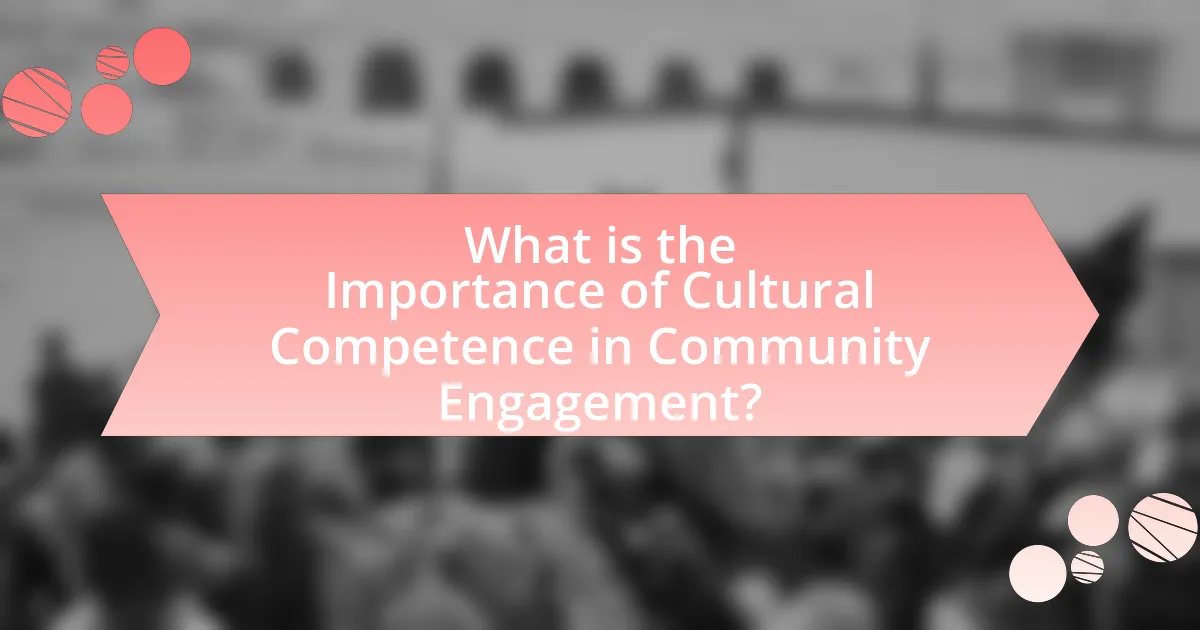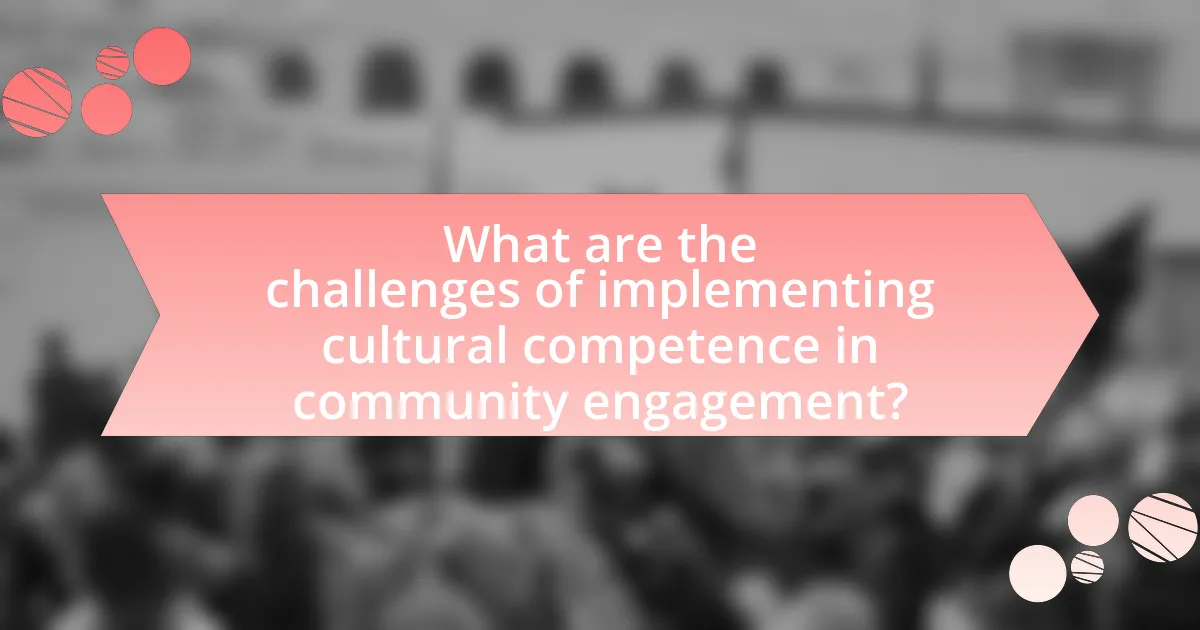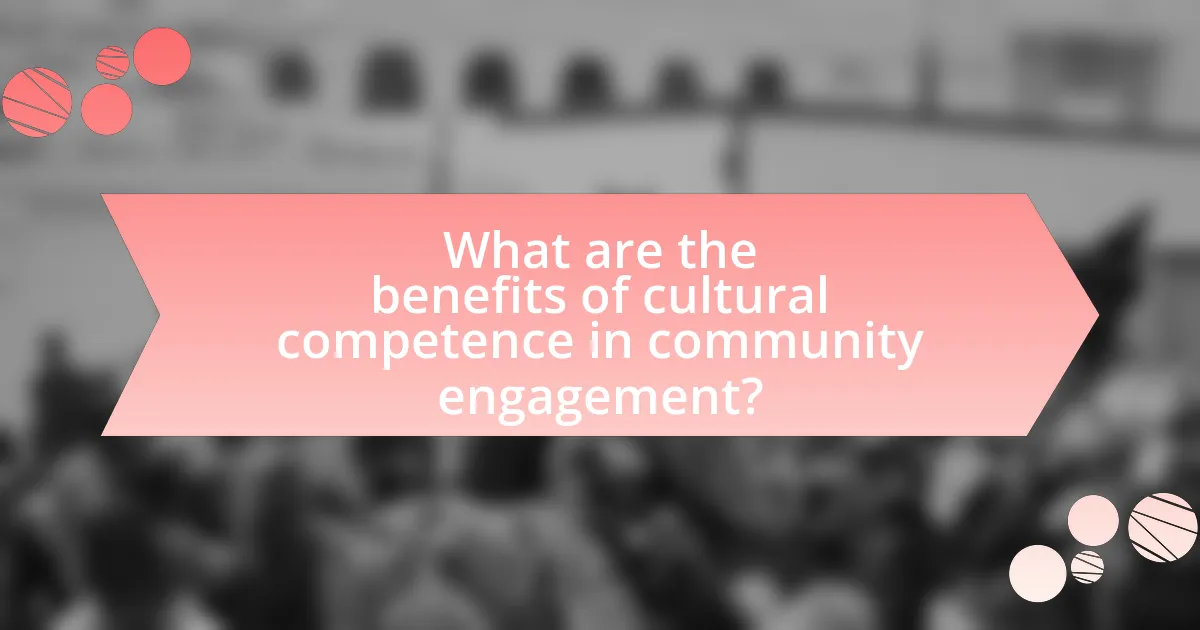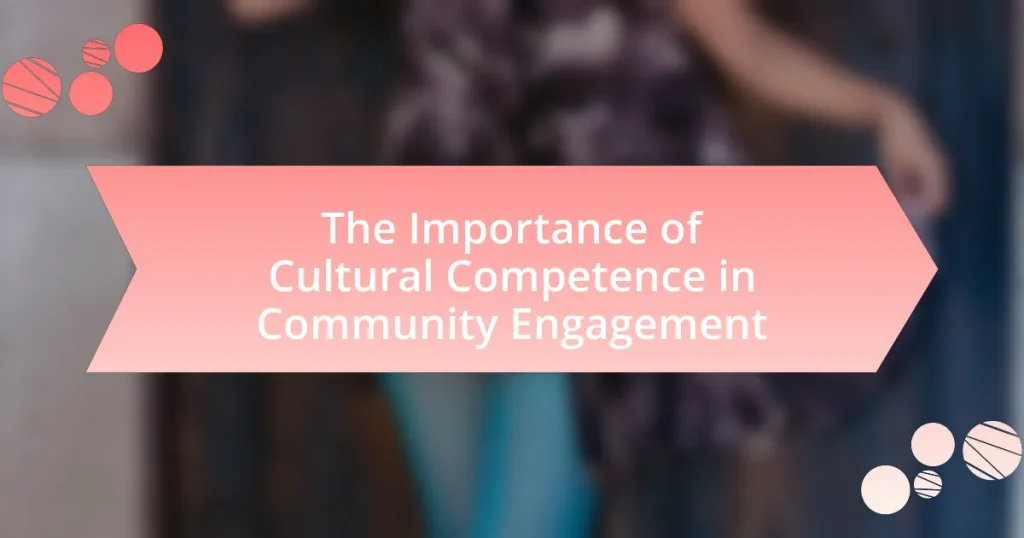Cultural competence is a critical factor in community engagement, as it enhances communication, fosters trust, and improves collaboration among diverse groups. The article explores the significance of cultural competence in building inclusive programs that resonate with various cultural backgrounds, leading to increased participation and better outcomes in community initiatives. Key elements of cultural competence, such as awareness of personal biases, knowledge of different cultural practices, and effective communication skills, are discussed alongside the challenges organizations face in implementing these practices. Additionally, the article highlights the positive impacts of cultural competence on community relationships, participation, and service delivery, emphasizing the need for ongoing training and assessment to overcome barriers and promote inclusivity.

What is the Importance of Cultural Competence in Community Engagement?
Cultural competence is crucial in community engagement as it fosters effective communication and collaboration among diverse groups. By understanding and respecting different cultural backgrounds, community leaders and organizations can build trust and rapport, leading to more inclusive and effective programs. Research indicates that culturally competent practices enhance participation rates and improve outcomes in community initiatives, as evidenced by a study published in the Journal of Community Psychology, which found that culturally tailored interventions significantly increased engagement among minority populations.
Why is cultural competence essential for effective community engagement?
Cultural competence is essential for effective community engagement because it enables individuals and organizations to understand, communicate with, and effectively interact with people across diverse cultures. This understanding fosters trust and collaboration, which are critical for successful community initiatives. Research indicates that culturally competent approaches lead to higher participation rates in community programs, as they resonate more with the values and needs of diverse populations. For instance, a study published in the Journal of Community Psychology found that culturally tailored interventions significantly improved engagement outcomes in minority communities, demonstrating the direct impact of cultural competence on community involvement.
What are the key elements of cultural competence?
The key elements of cultural competence include awareness of one’s own cultural worldview, knowledge of different cultural practices and worldviews, and the ability to communicate and interact effectively across cultures. Awareness involves recognizing personal biases and assumptions, which is essential for understanding how these factors influence interactions with individuals from diverse backgrounds. Knowledge encompasses understanding cultural differences, including values, beliefs, and customs, which can impact communication and behavior. Effective communication skills are crucial for building relationships and fostering trust, enabling individuals to engage meaningfully with diverse communities. These elements collectively enhance the ability to work effectively in multicultural environments, promoting inclusivity and understanding in community engagement.
How does cultural competence influence community relationships?
Cultural competence significantly enhances community relationships by fostering understanding and respect among diverse groups. When individuals and organizations possess cultural competence, they are better equipped to communicate effectively, address the unique needs of various cultural groups, and build trust. Research indicates that communities with high levels of cultural competence experience improved collaboration and reduced conflict, as evidenced by a study published in the Journal of Community Psychology, which found that culturally competent practices led to increased community cohesion and participation. This demonstrates that cultural competence is essential for nurturing positive interactions and relationships within diverse communities.
How does cultural competence impact community participation?
Cultural competence significantly enhances community participation by fostering inclusive environments where diverse voices are valued and heard. When community leaders and organizations possess cultural competence, they are better equipped to understand and address the unique needs and perspectives of various cultural groups. This understanding leads to increased trust and collaboration, as evidenced by studies showing that culturally competent initiatives result in higher engagement rates among marginalized populations. For instance, a report by the National Institute of Health highlights that culturally tailored health programs improve participation rates by 30% in communities with diverse backgrounds. Thus, cultural competence directly correlates with improved community involvement and empowerment.
What role does cultural competence play in building trust within communities?
Cultural competence plays a crucial role in building trust within communities by fostering understanding and respect among diverse groups. When individuals and organizations demonstrate cultural competence, they effectively communicate and engage with community members, acknowledging their unique backgrounds and experiences. This approach leads to stronger relationships, as evidenced by studies showing that culturally competent practices can enhance collaboration and reduce misunderstandings, ultimately resulting in increased community cohesion and trust. For instance, research published in the Journal of Community Psychology highlights that culturally competent interventions significantly improve community engagement outcomes, reinforcing the importance of this competence in establishing trust.
How can cultural competence enhance communication in community settings?
Cultural competence enhances communication in community settings by fostering understanding and respect among diverse groups. When individuals possess cultural competence, they are better equipped to navigate differences in language, values, and social norms, which reduces misunderstandings and promotes effective dialogue. Research indicates that culturally competent communication can lead to improved relationships and collaboration within communities, as evidenced by a study published in the Journal of Community Psychology, which found that culturally aware interventions increased participation rates in community programs by 30%. This demonstrates that cultural competence not only facilitates clearer communication but also strengthens community engagement and cohesion.

What are the challenges of implementing cultural competence in community engagement?
Implementing cultural competence in community engagement faces several challenges, including resistance to change, lack of training, and insufficient understanding of diverse cultural contexts. Resistance to change often stems from established practices and beliefs within organizations, making it difficult to adopt new approaches that prioritize cultural sensitivity. Additionally, many community engagement professionals lack adequate training in cultural competence, which hinders their ability to effectively interact with diverse populations. Furthermore, a limited understanding of the specific cultural contexts of the communities being engaged can lead to miscommunication and ineffective outreach efforts. These challenges highlight the need for targeted training and a commitment to ongoing learning in order to enhance cultural competence in community engagement initiatives.
What barriers exist to achieving cultural competence?
Barriers to achieving cultural competence include lack of awareness, insufficient training, and systemic biases. Lack of awareness often stems from limited exposure to diverse cultures, which can hinder understanding and empathy. Insufficient training in cultural competence can result in professionals being ill-equipped to engage effectively with diverse communities. Systemic biases, such as institutional racism or discrimination, can create environments that are not conducive to cultural understanding and inclusivity. These barriers collectively impede the development of effective communication and relationships across cultural lines, ultimately affecting community engagement efforts.
How do systemic issues affect cultural competence in communities?
Systemic issues significantly hinder cultural competence in communities by perpetuating inequalities and limiting access to resources. These issues, such as poverty, discrimination, and inadequate education, create barriers that prevent individuals from understanding and appreciating diverse cultural perspectives. For instance, communities facing systemic racism often experience reduced opportunities for intercultural interactions, which are essential for developing cultural competence. Research indicates that areas with high levels of socioeconomic disparity show lower levels of community engagement and cultural awareness, as evidenced by the findings in the “Cultural Competence and Community Engagement” study published by the American Journal of Community Psychology. This study highlights that systemic barriers directly correlate with diminished cultural competence, as they restrict meaningful exchanges and learning opportunities among diverse groups.
What are common misconceptions about cultural competence?
Common misconceptions about cultural competence include the belief that it is solely about acquiring knowledge of different cultures or that it can be achieved through a one-time training session. Cultural competence is a continuous process that involves understanding and respecting diverse cultural perspectives, which requires ongoing education and self-reflection. Additionally, some people mistakenly think that cultural competence is only relevant for professionals in healthcare or education, while it is essential in all fields, including business and community engagement, to foster effective communication and collaboration.
How can organizations overcome these challenges?
Organizations can overcome challenges in cultural competence by implementing comprehensive training programs that focus on diversity, equity, and inclusion. These programs equip employees with the necessary skills to understand and engage effectively with diverse communities. Research indicates that organizations with robust diversity training see a 30% increase in employee engagement and collaboration, leading to improved community relations. Additionally, fostering partnerships with local cultural organizations can provide valuable insights and resources, enhancing the organization’s ability to connect with various community groups.
What strategies can be employed to promote cultural competence?
To promote cultural competence, organizations can implement training programs that focus on diversity, equity, and inclusion. These programs educate participants about different cultural perspectives and practices, enhancing understanding and reducing biases. Research indicates that organizations with comprehensive diversity training see improved employee engagement and collaboration, as evidenced by a study published in the Journal of Applied Psychology, which found that effective diversity training can lead to a 20% increase in team performance. Additionally, fostering partnerships with diverse community organizations allows for shared learning experiences, further enriching cultural awareness and competence within the community.
How can training and education improve cultural competence in community engagement?
Training and education enhance cultural competence in community engagement by equipping individuals with the knowledge and skills necessary to understand and respect diverse cultural perspectives. This process involves structured learning experiences that address cultural awareness, sensitivity, and effective communication strategies. Research indicates that culturally competent individuals are better able to build trust and foster collaboration within diverse communities, leading to more effective engagement outcomes. For example, a study published in the Journal of Community Psychology found that training programs focused on cultural competence significantly improved participants’ ability to navigate cultural differences, resulting in increased community participation and satisfaction.

What are the benefits of cultural competence in community engagement?
Cultural competence in community engagement enhances communication, fosters trust, and improves service delivery. By understanding and respecting diverse cultural backgrounds, organizations can tailor their approaches to meet the specific needs of various communities. This leads to increased participation and collaboration, as community members feel valued and understood. Research indicates that culturally competent practices can reduce disparities in health and social services, as evidenced by a study published in the Journal of Health Care for the Poor and Underserved, which found that culturally tailored interventions significantly improved health outcomes among minority populations.
How does cultural competence lead to more inclusive communities?
Cultural competence leads to more inclusive communities by fostering understanding and respect among diverse groups. When individuals and organizations develop cultural competence, they enhance their ability to communicate effectively and empathize with people from different backgrounds. This understanding reduces biases and stereotypes, creating an environment where all community members feel valued and included. Research indicates that culturally competent practices in community engagement can improve participation rates among marginalized groups, as seen in studies like “Cultural Competence in Community Engagement” by the American Psychological Association, which highlights that inclusive practices lead to better outcomes in community health and social cohesion.
What positive outcomes arise from culturally competent community initiatives?
Culturally competent community initiatives lead to enhanced social cohesion and improved health outcomes. These initiatives foster understanding and respect among diverse groups, which strengthens community ties and reduces social isolation. For instance, a study by the Robert Wood Johnson Foundation found that communities with culturally competent programs reported higher levels of trust and collaboration among residents, resulting in increased participation in local governance and community activities. Additionally, culturally tailored health programs have been shown to improve access to care and health literacy, ultimately leading to better health outcomes for marginalized populations, as evidenced by research published in the American Journal of Public Health.
How can cultural competence improve service delivery in communities?
Cultural competence can significantly improve service delivery in communities by enhancing understanding and responsiveness to diverse cultural needs. When service providers possess cultural competence, they are better equipped to communicate effectively, build trust, and tailor services to meet the specific preferences and values of various cultural groups. Research indicates that culturally competent care leads to higher satisfaction rates among clients, as evidenced by a study published in the Journal of Health Care for the Poor and Underserved, which found that culturally tailored interventions improved health outcomes and increased engagement in services. This alignment between service delivery and cultural expectations fosters a more inclusive environment, ultimately leading to better community health and well-being.
What are the long-term impacts of cultural competence on community development?
Cultural competence significantly enhances community development by fostering inclusivity and improving social cohesion. When community members and leaders understand and respect diverse cultural backgrounds, they can create programs and policies that address the specific needs of all groups, leading to more effective resource allocation and participation. Research indicates that culturally competent communities experience higher levels of trust and collaboration among residents, which can result in increased civic engagement and reduced social tensions. For instance, a study by the National League of Cities found that cities with strong cultural competence initiatives reported a 30% increase in community participation in local governance. This demonstrates that cultural competence not only enriches community interactions but also drives sustainable development by ensuring that all voices are heard and valued.
How does cultural competence contribute to social cohesion?
Cultural competence contributes to social cohesion by fostering understanding and respect among diverse groups. When individuals possess cultural competence, they are better equipped to communicate effectively and empathize with others, which reduces misunderstandings and conflicts. Research indicates that communities with high levels of cultural competence experience lower rates of social isolation and increased collaboration among different cultural groups. For instance, a study by the American Psychological Association found that culturally competent practices in community programs lead to enhanced trust and cooperation, ultimately strengthening social bonds.
What role does cultural competence play in sustainable community growth?
Cultural competence plays a crucial role in sustainable community growth by fostering inclusive participation and collaboration among diverse groups. When community leaders and members understand and respect cultural differences, they can effectively address the unique needs and perspectives of all stakeholders, leading to more equitable resource distribution and decision-making. Research indicates that communities with high cultural competence experience increased social cohesion and trust, which are essential for long-term sustainability. For instance, a study by the National League of Cities found that culturally competent practices in local governance enhance community engagement and improve public services, ultimately contributing to sustainable development.
What practical steps can organizations take to enhance cultural competence?
Organizations can enhance cultural competence by implementing comprehensive training programs focused on diversity, equity, and inclusion. These programs should include workshops that educate employees about different cultural practices, biases, and communication styles, fostering an environment of understanding and respect. Research indicates that organizations with effective diversity training see a 30% increase in employee engagement and collaboration, as reported by the Harvard Business Review. Additionally, organizations should actively recruit a diverse workforce, ensuring representation from various cultural backgrounds, which can lead to improved decision-making and innovation. Regular assessments of cultural competence through surveys and feedback mechanisms can also help organizations identify areas for improvement and track progress over time.
What best practices should be followed for effective cultural competence training?
Effective cultural competence training should incorporate experiential learning, ongoing assessment, and diverse perspectives. Experiential learning allows participants to engage in real-life scenarios that reflect cultural interactions, enhancing understanding and empathy. Ongoing assessment ensures that training is relevant and effective, adapting to the evolving needs of the community. Including diverse perspectives, such as those from various cultural backgrounds, enriches the training content and fosters a more inclusive environment. Research indicates that programs integrating these practices lead to improved cultural awareness and sensitivity, ultimately enhancing community engagement outcomes.
How can organizations assess their cultural competence levels?
Organizations can assess their cultural competence levels by utilizing self-assessment tools, conducting surveys, and engaging in focus groups. Self-assessment tools, such as the Cultural Competence Assessment Tool developed by the National Center for Cultural Competence, provide a structured way for organizations to evaluate their policies, practices, and staff attitudes towards cultural diversity. Surveys can gather quantitative data on employee perceptions and experiences related to cultural competence, while focus groups allow for in-depth discussions that reveal underlying issues and areas for improvement. Research indicates that organizations that regularly assess their cultural competence are better equipped to serve diverse communities effectively, as evidenced by improved service delivery outcomes and increased community trust.
